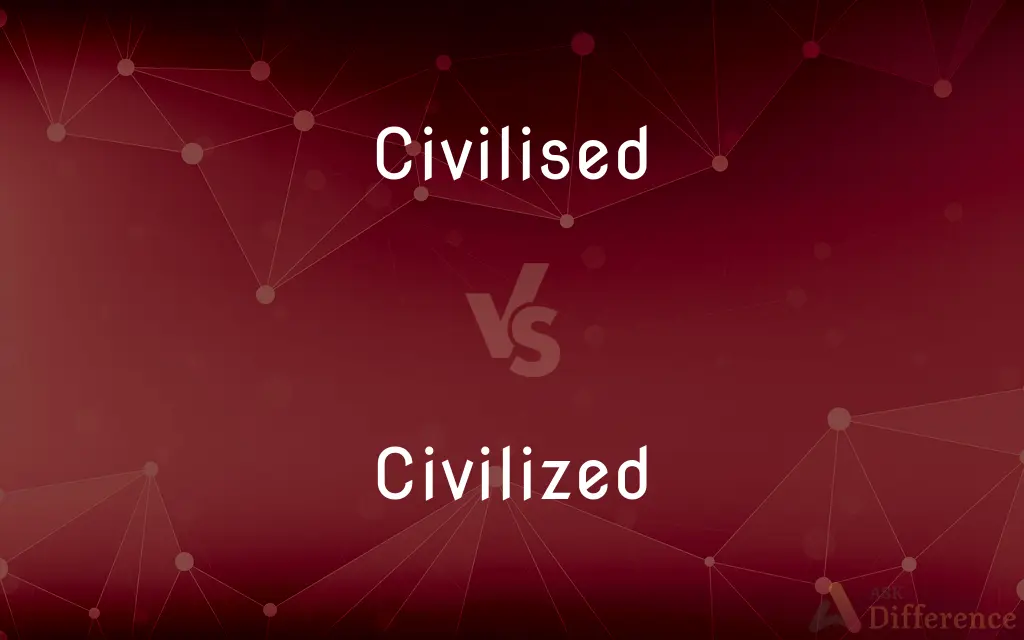Civilised vs. Civilized — What's the Difference?
By Urooj Arif & Maham Liaqat — Updated on April 24, 2024
"Civilised" and "civilized" are both correct spellings of the same adjective, differing primarily in regional usage: "civilised" is preferred in British English, while "civilized" is favored in American English.

Difference Between Civilised and Civilized
Table of Contents
ADVERTISEMENT
Key Differences
The term "civilised" is commonly used in British English, reflecting the standard spelling conventions of the region, which often retains more traditional forms of words. On the other hand, "civilized" is the preferred spelling in American English, which typically adopts more simplified forms.
When written in British publications, "civilised" aligns with other British English spellings that end in "-ise" such as "realise" and "organise." Conversely, American publications use "civilized," consistent with other "-ize" endings like "realize" and "organize," reflecting a systematic difference in language standardization between the two regions.
The pronunciation of "civilised" and "civilized" remains the same despite the spelling difference, indicating that the variation does not affect the phonetic expression of the word. Whereas the choice of spelling can sometimes signal the writer's regional identity or the intended audience of the text.
In educational contexts, British schools teach the "-ise" spelling as the correct form, reinforcing "civilised" among students and academic settings. On the other hand, in American schools, "civilized" is taught as part of American English standards, emphasizing the "-ized" spelling in their curricula.
In digital and global communication, the choice between "civilised" and "civilized" may depend on the default settings of software or the international nature of the platform, which can favor one form over the other to maintain consistency in communication.
ADVERTISEMENT
Comparison Chart
Regional Preference
British English
American English
Common Spellings
Alongside "realise," "organise"
Alongside "realize," "organize"
Pronunciation
Same as "civilized"
Same as "civilised"
Educational Use
Taught in British schools
Taught in American schools
Global Use
May change in international settings
Dominant in international software
Compare with Definitions
Civilised
Characterized by a high state of culture and development.
Ancient Greece is often considered one of the most civilised societies.
Civilized
Exhibiting courtesy and good manners.
It’s important to remain civilized during negotiations.
Civilised
Advanced in terms of social norms and constructs.
A civilised society upholds the rule of law and respects human rights.
Civilized
Referring to a society that has developed complex institutions.
The Maya were a highly civilized ancient civilization.
Civilised
Showing politeness and refinement in behavior.
They conducted themselves in a civilised manner during the debate.
Civilized
Opposite of primitive or uncultured.
Their approach to resolving conflicts is very civilized.
Civilised
Free from barbarity or crudeness.
The discussion remained civilised despite differing opinions.
Civilized
Indicative of a well-structured community.
The city’s civilized public spaces are admired by visitors.
Civilised
Well-organized and socially developed.
The city is known for its civilised urban planning.
Civilized
Evolved in terms of cultural and social sophistication.
The film explores what it means to be truly civilized.
Civilised
Simple past tense and past participle of civilise
Civilized
Having a highly developed society and culture.
Civilised
Alternative spelling of civilized
Civilized
Showing evidence of moral and intellectual advancement; humane, ethical, and reasonable
Terrorist acts that shocked the civilized world.
Civilised
Having a high state of culture and development both social and technological;
Terrorist acts that shocked the civilized world
Civilized
Marked by refinement in taste and manners; cultured.
Civilised
Marked by refinement in taste and manners;
Cultivated speech
Cultured Bostonians
Cultured tastes
A genteel old lady
Polite society
Civilized
Having a highly developed society or culture; belonging to civilization.
Civilized
Showing evidence of moral and intellectual advancement; humane, reasonable, ethical.
Civilized
Marked by refinement in taste and manners.
Civilized
Simple past tense and past participle of civilize
Civilized
Reclaimed from savage life and manners; instructed in arts, learning, and civil manners; refined; cultivated.
Sale of conscience and duty in open market is not reconcilable with the present state of civilized society.
Civilized
Having a high state of culture and development both social and technological;
Terrorist acts that shocked the civilized world
Civilized
Marked by refinement in taste and manners;
Cultivated speech
Cultured Bostonians
Cultured tastes
A genteel old lady
Polite society
Common Curiosities
Can "civilised" and "civilized" be used interchangeably?
Yes, they can be used interchangeably as they mean the same thing, though regional spelling preferences may apply.
How should I spell "civilized" if I am writing for an international audience?
For international audiences, either spelling can be acceptable, though "civilized" may be more commonly recognized globally due to the influence of American English.
What is the difference between "civilised" and "civilized"?
"Civilised" is the British English spelling, while "civilized" is used in American English.
Why do British English and American English have different spellings for the same words?
Differences in spelling arose from various historical, cultural, and linguistic influences that shaped each version of English over time.
What factors should influence my choice of spelling in professional writing?
Consider your audience, the publication's style guide, and regional norms when choosing spellings.
Is one spelling more correct than the other?
Neither spelling is more correct; the choice depends on the regional language standards being followed.
Can software settings be adjusted to favor one spelling over the other?
Yes, most word processing software allows users to choose between British and American English spellings.
How has global communication influenced the use of British and American spellings?
Global communication platforms often standardize language use, sometimes favoring American spellings due to broader international exposure.
Does using a different spelling form affect the meaning of "civilised/civilized"?
The meaning remains the same; only the spelling changes.
Is it important to be consistent with spelling variations in a single document?
Consistency in spelling within a document is important for maintaining style and coherence.
What is the impact of using British spelling in an American context, and vice versa?
Using a non-local spelling might seem out of place but typically doesn't lead to misunderstanding, though it may subtly signal non-local authorship.
Will using the "wrong" spelling affect my writing's reception?
Using a spelling that is not customary for your audience may affect the perceived professionalism or regional alignment of your writing.
What are other examples of words that differ in spelling by region like "civilised" and "civilized"?
Examples include "colour" (British) vs. "color" (American), and "favour" (British) vs. "favor" (American).
Are there dictionaries that prefer one spelling over the other?
British dictionaries typically list "civilised" as the primary spelling, while American dictionaries list "civilized."
How do educational systems in different countries teach these spelling differences?
Educational systems teach spelling according to national standards, which reflect either British or American usage.
Share Your Discovery

Previous Comparison
Bite vs. Chew
Next Comparison
Pun vs. ParonomasiacAuthor Spotlight
Written by
Urooj ArifUrooj is a skilled content writer at Ask Difference, known for her exceptional ability to simplify complex topics into engaging and informative content. With a passion for research and a flair for clear, concise writing, she consistently delivers articles that resonate with our diverse audience.
Co-written by
Maham Liaqat













































